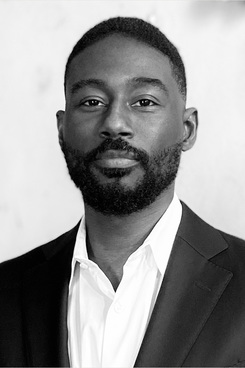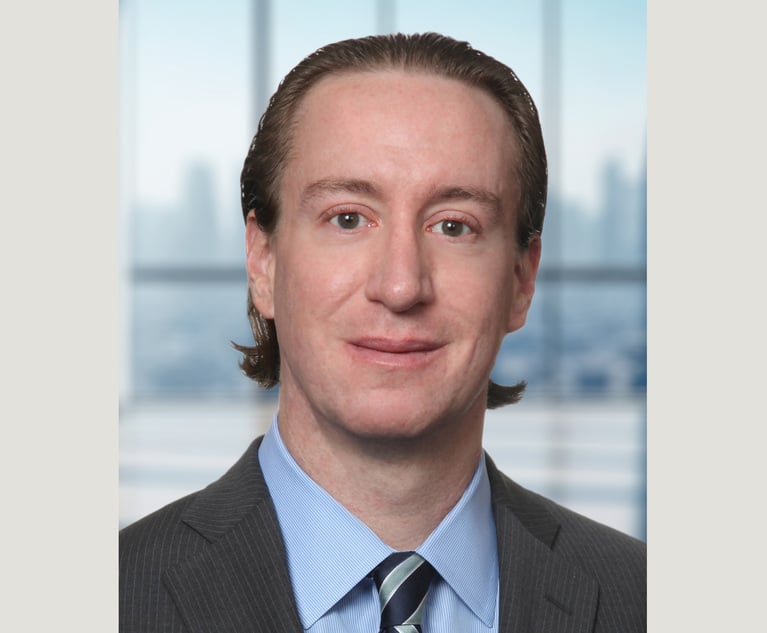'It's Like a War': The Fight Against Big Law's Complacency on Diversity
"That is why diversity numbers in the legal profession have not meaningfully changed in almost two decades," former Big Law attorney Esuga Abaya says. "The weapons being used are ineffective or insufficient."
July 02, 2020 at 09:00 AM
10 minute read
The original version of this story was published on The Legal Intelligencer
 Esuga Abaya of GrowthCounsel in Philadelphia.
Esuga Abaya of GrowthCounsel in Philadelphia.
Esuga Abaya is a business attorney at GrowthCounsel, a boutique corporate law firm in Philadelphia with five attorneys, who previously worked at two Am Law 100 firms.
Abaya represents a range of clients, from startups and early-stage enterprises to Fortune 500 companies, on a variety of corporate and commercial matters in numerous industries, including software, technology, life sciences, insurance and financial services. He started his career in the corporate and securities group at Pepper Hamilton, where he spent five years, then moved to the corporate group at DLA Piper for three years, before joining GrowthCounsel.
Abaya has witnessed what he describes as an "exodus" of Black attorneys from corporate firms, and shared his insights about his career and his perspective. Abaya has a J.D. from Villanova University (Order of the Coif, Law Review), and a Master of Business Administration from the University of Findlay.
The below responses were edited lightly for style.
ALM: Are there elements of the professional and/or cultural environment of a corporate law firm that are particularly challenging to a Black attorney?
Abaya: The law firm environment is generally a difficult corporate environment. Because the baseline is long hours and hard work, only a certain type of person opts into it. The lawyers who want to stay have to be nurtured and cultivated by the organization. The most important issue is there is often not enough mentoring and support within these organizations to encourage Black attorneys to stay. Not enough senior attorneys, particularly partners, take the time to be intentionally involved in a junior lawyer's development. The fast pace of the law firm makes it generally difficult to take the necessary time to train junior lawyers, and Black lawyers in particular get left behind.
For example, good mentoring often means giving someone the benefit of the doubt and knowing they might fail, even allowing them to fail. There has to be a trial-and-error process that is required for learning. The law firm environment is intolerant of errors by its nature; errors are seen as a waste of time or could make you look bad to a client. A busy partner is choosing against all the other demands on his or her attention when investing time to teach an associate, and Black associates are often not given this opportunity in the same way that white associates are.
This contributes to an already vicious cycle, because I also saw a pattern where Black attorneys at a junior level are given significantly less work, and therefore do not have the same opportunities to learn as their white counterparts. In a profession that requires a high amount of "reps" to develop and be successful, this lack of opportunity can be fatal to someone's career. The small number of Black partners at corporate firms is a symptom of this cycle.
Many corporate firms have made an effort to recruit Black associates. Why the retention problem?
The problem is multifaceted, but the most significant issue, other than lack of mentoring, is that corporate firms have not been able to convince Black associates, and frankly other associates, of the value proposition for staying at the firm. On this I can speak from experience. After I became a senior associate at DLA, at my evaluation that year, there was discussion about making partner. When I did the research of what is required of a lawyer, particularly of Black lawyers, to make partner at a firm like that, from my perspective it was not worth it.
For one, there is no generally applicable formula for advancement. The process involves not only hard work and lots of time, it also involves soft factors like politics and network, which in my opinion naturally disadvantages Black associates and can leave them frustrated with the process. But even attaining partnership doesn't mean those things go away. At corporate firms, even if you become an equity partner and bring in your own business, you may still have to fight for the credit for your work. And even if you get credit for your work, you may not get appropriately compensated. As an associate, I personally saw these things happen.
Black lawyers are also fighting against the disadvantages of their network. Meaning, one of the primary ways of navigating these issues within the firm is by finding allies. But Black lawyers make up about 3-4% of the legal profession, so the percent of Black lawyers that become partner at a corporate firm is minuscule and it works against you because you don't have the same pool of natural allies. I think law firms underestimate how much network effects advantage white lawyers and how powerful that network effect can be in determining success at a law firm. It takes so much to become a partner at a firm, and many Black lawyers believe they have to work even harder than their white colleagues, and many decide it is not worth it. The money is definitely an incentive—partners may make millions of dollars per year—and there are other incentives, such as recognition or prestige, or stimulating work, but for many Black associates, those do not outweigh the very real possibility that you could work very hard and put in all that time and still not succeed simply because of soft factors that are out of your control.
Pepper has increased their efforts to recruit and hire black attorneys, but today there are very few there. There is an effort to bring on black summer associates, and many do join the firm, but then decide not to stay.
Is the attorney review process conducted in a fair manner at corporate firms?
I give law firms the benefit of the doubt that they want their reviews to be fair, and even try to structure their reviews to be fair. But ultimately, human beings implement review processes, and human beings can be unfair, even within a seemingly fair process.
For example, I received a negative review once as an associate that I definitely thought was unfair. The review essentially said that I was avoiding work, which was absolutely not the case. Luckily, well before the review I had raised some of the issues I was having with a Black partner in the office, who happened to be the firm's lead diversity partner, which gave me the opportunity to challenge that review and show that I was being proactive in addressing concerns. I could not have gone to the head of the practice group because he was too far removed from the situation. Frankly, I'm not sure what the correct protocol would have been. I specifically went to this partner because he is Black. He went to bat for me, and I stayed at the firm for another two years.
That story illustrates two things, fairness can be debated and it often takes a composite view to understand what is fair, and to defend yourself against unfairness in a system where you sit on the lower end of a power differential requires finding others in that system with more power than yourself who will work on your behalf, and many Black associates don't have that.
What could corporate firms do better in terms of hiring and retaining Black attorneys?
I think of this issue in terms of war. It's like a war against an attitude of complacency and self-interest that naturally excludes people of color and preserves the status quo. That is why diversity numbers in the legal profession have not meaningfully changed in almost two decades. The weapons being used are ineffective or insufficient. They include things like hiring diversity professionals, or starting diversity recruitment programs. To win this war requires winning people's hearts and minds, because you are fighting against an idea. That is very hard to do.
We need a systemic cultural shift in the way law firms work. The people who are in power in these firms are the very people that benefit the most from the current system. Somehow, we have to convince them that recruiting, retaining, promoting and including Black attorneys is a good thing, and not only that, it is worth whatever they believe will be the associated costs. Law firms, and especially large law firms, have the resources to meaningfully diversify their organizations, what is lacking, and what a few decades of diversity efforts seems to show, is that they do not have the will.
The more I see society changing on the issue of social justice and race relations, the more law firms will change. Firms tend to follow changes in society, which are taking place in significant ways. For example, a large number of protesters were white [who participated in the protests over the tragic death of George Floyd on May 25].
How do you feel about the term "attorneys of color"?
Frankly, I'm not that bothered by it. But I think using the term "attorneys of color" allows law firms to talk about diversity generally. It is a broad-brush term that does not reflect the unique history of Black lawyers specifically, and African Americans in general.
Why are Black attorneys increasingly drawn to boutique and midsize firms?
I decided relatively early in my legal career that if I was going to continue being a lawyer, I needed maximum autonomy and flexibility. I had the good fortune to get legal training at the highest level of corporate practice at some of the largest law firms in the world, but ultimately, I found more fulfillment working with startups and small businesses, and especially leveraging my expertise to help Black-owned businesses and entrepreneurs. I saw an opportunity to use my training to serve that community.
Black-owned companies and Black entrepreneurs are particularly underfunded and under-resourced. The large law firm financial model is not conducive to building the type of practice that serves them, at least not at the early stages. But boutique firms provide the flexibility, financially and otherwise, to do things that wouldn't work in a large law firm context. It might also be that boutique and midsize firms give Black lawyers more power to determine their own careers because the top of the power structure is not as far removed. There is a feeling of having more agency or access.
Part of it may also be a numbers game, where fewer people at the firm means any Black lawyer represents a larger percentage. But I would caution against seeing boutique or midsize firms as necessarily better environments for Black lawyers. The issue of diversity in the legal profession is very nuanced, which is why solutions are so elusive. I think the profession as a whole can do better to encourage more representation by Black lawyers, from boutique firms to the Am Law 100.
This content has been archived. It is available through our partners, LexisNexis® and Bloomberg Law.
To view this content, please continue to their sites.
Not a Lexis Subscriber?
Subscribe Now
Not a Bloomberg Law Subscriber?
Subscribe Now
NOT FOR REPRINT
© 2025 ALM Global, LLC, All Rights Reserved. Request academic re-use from www.copyright.com. All other uses, submit a request to [email protected]. For more information visit Asset & Logo Licensing.
You Might Like
View All
Saul Ewing Loses Two Partners to Fox Rothschild, Marking Four Fla. Partner Exits in Last 13 Months
3 minute read
Dentons Taps D.C. Capital Markets Attorney for New US Managing Partner

Exceptional Growth Becoming the Rule? Demand Drove Strong Year for Big Law

Eagles or Chiefs? At These Law Firms, Super Bowl Sunday Gets Complicated
3 minute readLaw Firms Mentioned
Trending Stories
Who Got The Work
J. Brugh Lower of Gibbons has entered an appearance for industrial equipment supplier Devco Corporation in a pending trademark infringement lawsuit. The suit, accusing the defendant of selling knock-off Graco products, was filed Dec. 18 in New Jersey District Court by Rivkin Radler on behalf of Graco Inc. and Graco Minnesota. The case, assigned to U.S. District Judge Zahid N. Quraishi, is 3:24-cv-11294, Graco Inc. et al v. Devco Corporation.
Who Got The Work
Rebecca Maller-Stein and Kent A. Yalowitz of Arnold & Porter Kaye Scholer have entered their appearances for Hanaco Venture Capital and its executives, Lior Prosor and David Frankel, in a pending securities lawsuit. The action, filed on Dec. 24 in New York Southern District Court by Zell, Aron & Co. on behalf of Goldeneye Advisors, accuses the defendants of negligently and fraudulently managing the plaintiff's $1 million investment. The case, assigned to U.S. District Judge Vernon S. Broderick, is 1:24-cv-09918, Goldeneye Advisors, LLC v. Hanaco Venture Capital, Ltd. et al.
Who Got The Work
Attorneys from A&O Shearman has stepped in as defense counsel for Toronto-Dominion Bank and other defendants in a pending securities class action. The suit, filed Dec. 11 in New York Southern District Court by Bleichmar Fonti & Auld, accuses the defendants of concealing the bank's 'pervasive' deficiencies in regards to its compliance with the Bank Secrecy Act and the quality of its anti-money laundering controls. The case, assigned to U.S. District Judge Arun Subramanian, is 1:24-cv-09445, Gonzalez v. The Toronto-Dominion Bank et al.
Who Got The Work
Crown Castle International, a Pennsylvania company providing shared communications infrastructure, has turned to Luke D. Wolf of Gordon Rees Scully Mansukhani to fend off a pending breach-of-contract lawsuit. The court action, filed Nov. 25 in Michigan Eastern District Court by Hooper Hathaway PC on behalf of The Town Residences LLC, accuses Crown Castle of failing to transfer approximately $30,000 in utility payments from T-Mobile in breach of a roof-top lease and assignment agreement. The case, assigned to U.S. District Judge Susan K. Declercq, is 2:24-cv-13131, The Town Residences LLC v. T-Mobile US, Inc. et al.
Who Got The Work
Wilfred P. Coronato and Daniel M. Schwartz of McCarter & English have stepped in as defense counsel to Electrolux Home Products Inc. in a pending product liability lawsuit. The court action, filed Nov. 26 in New York Eastern District Court by Poulos Lopiccolo PC and Nagel Rice LLP on behalf of David Stern, alleges that the defendant's refrigerators’ drawers and shelving repeatedly break and fall apart within months after purchase. The case, assigned to U.S. District Judge Joan M. Azrack, is 2:24-cv-08204, Stern v. Electrolux Home Products, Inc.
Featured Firms
Law Offices of Gary Martin Hays & Associates, P.C.
(470) 294-1674
Law Offices of Mark E. Salomone
(857) 444-6468
Smith & Hassler
(713) 739-1250










